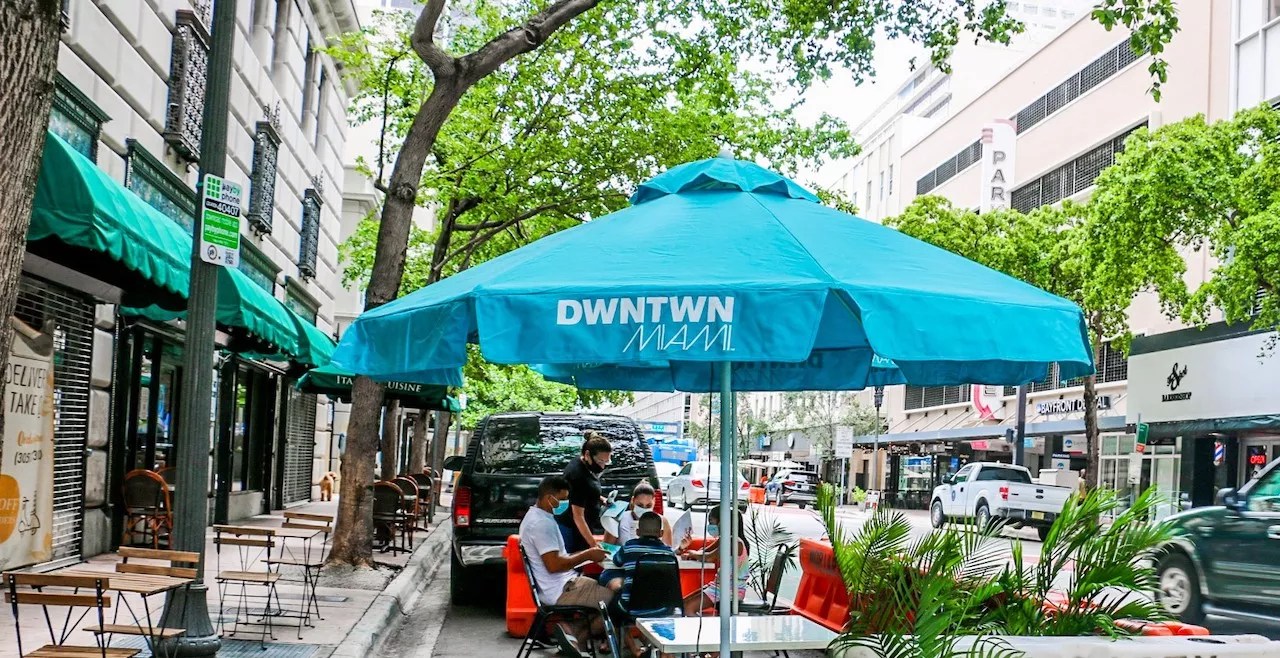
Photo courtesy of Miami DDA

Audio By Carbonatix
In response to the amended emergency order signed by Miami-Dade County Mayor Carlos A. Gimenez on July 6, which limits restaurants to outdoor seating only owing to a surge in the spread of COVID-19, the Miami Downtown Development Authority (DDA) has launched a Sidewalk Café Permit Program that allows downtown Miami restaurants to utilize the public-right-of-way to add or expand outdoor seating areas.
Restaurants can apply through a mobile-friendly form by submitting proof of insurance, a business tax receipt, and a narrative description of the design concept. The original permit fees, which varied by square footage, have been waived. The DDA’s program, which promises a 48-hour approval process, also covers the cost of the umbrellas, tables, and chairs restaurants might need in order to expand their outdoor footprint.
Brickell neighborhood restaurants are also eligible for the program.
So far, about two dozen restaurants have taken advantage of the program, including Rakija Grill, Cafe Bastille, Casa Tua Cucina, Pez Miami, Moxies, Over Under, the Auld Dubliner, Sparky’s Roadside Barbecue, Meet the Goat, Soya e Pomodoro, Favas Pizza, Las Palmas Cafeteria, Pollos y Jarras, Cvi.Che 105, Pega Grill, the Egg Spot, Kone Sushi Miami, and Nusr-Et Steakhouse.
“We are thankful that the city can understand our ordeal,” says Marija Banjac, Rakija Grill’s manager. The restaurant, which had no outdoor seating before joining the DDA’s program, can now accommodate 16 guests in its new outdoor area, which occupies the sidewalk and two parking spaces outside the front door. “If they can expand our operating hours to midnight, then maybe we can really do something. It’s hot during the day and at night is when people come out and they want to sit outside. They’re cooped up at home or working in an office all day.”
According to Christina Crespi, executive director of the Miami Downtown Development Authority, the current end date for the program is January 2021. If restaurants want to keep the outdoor seating after that, they’ll have to pay a fee, but a new application process is unlikely.
“Without the sidewalk, I would have to operate with only four tables,” says Cristian D’oria, chef/owner of Soya e Pomodoro on NE First Street just east of First Avenue. “From one day to the next, the eatery was empty after 16 years. And we still had to pay rent, taxes, and our employees. It’s been tough for us, but this permit is very helpful.”
According to the DDA, Miami’s urban core is home to 350 restaurants that serve a residential population of 100,000 across Brickell, downtown, and the Arts & Entertainment District. But the bustling area’s streets are now quiet, shops are empty, and only a few people are seen braving the daytime heat. Crespi said that when COVID-19 numbers go down, the agency will be looking into possibly doing full road closures so the retailers in the area could also benefit, which “would involve a balance so residents wouldn’t be disturbed,” she noted.
In an effort to drive business to the neighborhood eateries, the DDA also spearheaded the “Go Local, Go Direct” campaign, which offers discounts of ten percent or more on delivery orders placed directly from downtown restaurants. The agency is also a founding partner in the relief fund for bar and restaurant workers that was created by the South Beach Wine & Food Festival and Florida International University’s Chaplin School of Hospitality & Tourism Management. And DDA’s Downtown Ambassadors are distributing free disposable facemasks to residents and visitors.
“Now is a great time for us to be able to come up with new initiatives and policies. The pandemic is forcing governments to fast-track solutions of this nature,” Crespi says. “This whole scenario is also helping us connect face to face with local restaurant owners.”
Restaurant owners who want to join the program should email grachova@miamidda.com or visit miamidda.com.